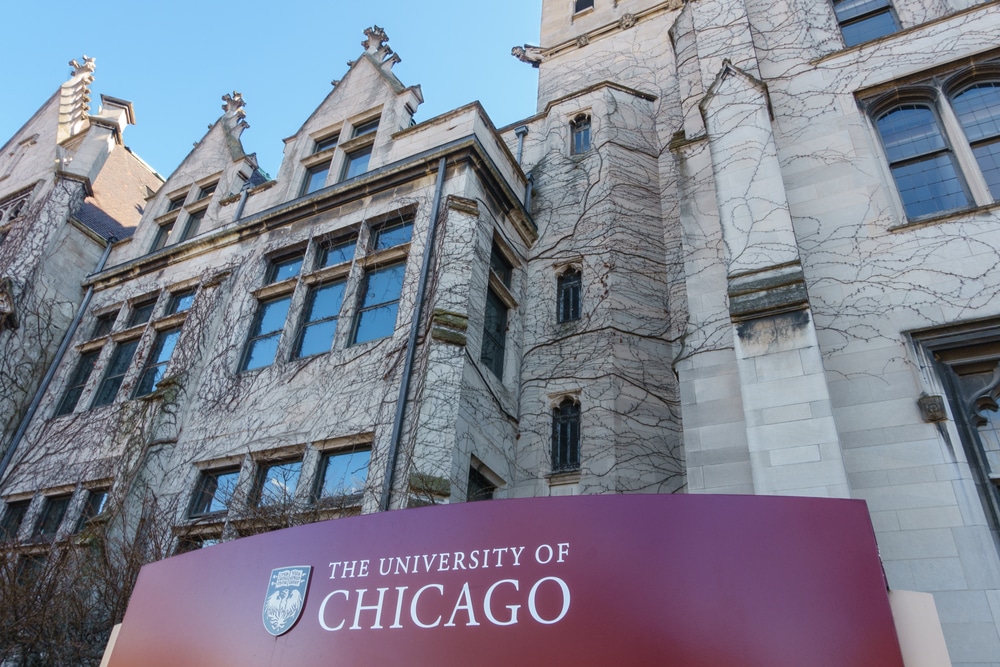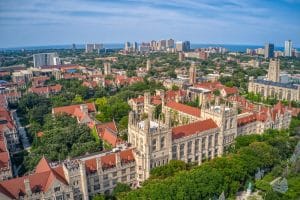Discovering Fun Facts About the UChicago
The University of Chicago; is known for its superior academics, notable alumni, unique traditions, and significant impact on its host city, Chicago. At the heart of the Midwest, it stands as a pillar of intellectual growth and innovation. Read on for interesting, fun facts and lesser-known tidbits about this UChicago.
A Brief History of the University of Chicago
Our exploration of the University of Chicago naturally begins with its inception. The journey of this prestigious institution has been nothing short of inspiring, filled with consistent progress and soaring achievements.
The University of Chicago, founded in 1890, has a rich and vibrant history that has shaped its identity as a leading educational institution. From its humble beginnings to its current status as a world-renowned university, the University of Chicago has been at the forefront of academic excellence and intellectual exploration.
Founding and Early Years
Conceived by the American Baptist Education Society, the University of Chicago was established thanks to a generous donation of $600,000 from oil magnate John D. Rockefeller. This significant financial support laid the foundation for the university’s mission to provide unconventional education to students, emphasizing the pursuit of knowledge over purely vocational studies.
The university’s first president, William Rainey Harper, was an ambitious visionary who played a pivotal role in shaping the institution’s early years. Recognizing the importance of expanding educational opportunities, Harper established the university’s extension programs, allowing individuals from diverse backgrounds to access higher education. Under his leadership, the University of Chicago quickly gained a reputation for its commitment to intellectual curiosity and academic rigor.
During this period, the university’s influence extended beyond the borders of Chicago. Harper’s vision of expansive learning led to the establishment of international programs, fostering collaborations with scholars from around the world. This global perspective enriched the university’s academic community and contributed to its growing reputation.
Notable Milestones
The University of Chicago has a history filled with remarkable milestones that have shaped its legacy. One of the fun facts about UChicago occurred in 1902 when the Chicago Maroons, the university’s sports teams, participated in the first-ever college football game played indoors. This groundbreaking event showcased the university’s commitment to innovation and willingness to push boundaries.
Another noteworthy landmark in the University of Chicago’s history is its role in the development of nuclear science. In 1942, physicist Enrico Fermi led a team of scientists in conducting the world’s first man-made, self-sustaining nuclear reaction. This groundbreaking achievement marked a significant advancement in scientific research and solidified the university’s reputation as a hub for groundbreaking discoveries.
Beyond scientific achievements, the University of Chicago has a proud legacy of championing free speech. This commitment to open and rigorous inquiry can be traced back to the university’s first president, William Rainey Harper. His belief in the power of intellectual freedom and the exchange of ideas laid the foundation for a tradition that continues to thrive on campus today.
Throughout its history, the University of Chicago has remained dedicated to providing a transformative educational experience. From its founding principles to its groundbreaking achievements and many fun facts across UChicago’s history, the university has consistently pushed the boundaries of knowledge and fostered an environment of intellectual curiosity. As the University of Chicago continues to shape the future of education, its rich history serves as a testament to the power of innovation and the pursuit of excellence.
Unique Campus Traditions
Stepping into the University of Chicago, you will quickly realize that this is a place with its heart in academia but its soul in its traditions. Few universities can boast a culture as vibrant and quirky as this.
Another known fun fact about UChicago is its unconventional student activities that go beyond the typical college experience. One of the most beloved traditions held by the College is “Scav,” a scavenger hunt that pulls participants into four days of riddles and absurdities. Students find themselves immersed in a world of creativity and problem-solving, crafting contraptions and traveling across state lines to bring back requested items. It’s an exhilarating adventure that showcases the ingenuity and resourcefulness of the University of Chicago students.
Another well-loved activity is the annual “Kuviasungnerk/Kangeiko” or “Kuvia.” This week-long winter event encourages students to embrace the brisk Chicago winter and get up for early morning exercise. It’s a testament to the resilience and determination of the University of Chicago community, as students gather before dawn to engage in various physical activities, from yoga to running. Kuvia promotes a healthy lifestyle and fosters a sense of camaraderie among participants as they brave the cold together.
In addition to these unique student activities, among the many fun facts about UChicago, it is home to a variety of annual events and festivals that students eagerly anticipate. One such event is the “University of Chicago Folk Festival,” a celebration of folk music that brings talented musicians from around the world to perform on campus. Students immerse themselves in the rich melodies and cultural expressions, experiencing the power of music to unite people from diverse backgrounds.
Another highly anticipated event is “Summer Breeze,” the college’s annual carnival and concert. This lively gathering features thrilling rides, delicious food stalls, and live performances by both student and professional artists. It’s a time when the campus comes alive with laughter, music, and the joy of summer, creating lasting memories for all who attend.
But it’s not just music and summer fun that define the University of Chicago’s traditions. The “Latke-Hamantash Debate” is a humorous academic discussion about the merits of two Jewish foods. This long-held tradition brings together faculty and students in a unique camaraderie as they engage in a lighthearted debate filled with wit and intellectual banter. It’s a testament to the University of Chicago’s commitment to fostering intellectual curiosity and embracing diverse perspectives.
Furthermore, the University of Chicago is home to the strikingly eccentric “Doc Films,” the nation’s oldest continuously running student film society. Run entirely by University of Chicago students; Doc Films screens a wide variety of films every day throughout the school year. From classic masterpieces to avant-garde experiments, the film selections cater to all tastes and spark thought-provoking discussions among the student body. Doc Films is not just a place to watch movies; it’s a community that celebrates the art of cinema and encourages the exploration of different cinematic styles and themes.
Famous Alumni and their Contributions
The University of Chicago’s rigorous approach to academics and liberal arts education has produced a number of extraordinary alumni who have gone on to impact the world in diverse ways significantly.
One notable alumnus who has made a tremendous impact is physicist James Cronin. Cronin, a former faculty member at the University of Chicago, was awarded the Nobel Prize in Physics in 1980 for his groundbreaking work on violating fundamental symmetry principles in the decay of neutral K-mesons. His research revolutionized our understanding of particle physics and laid the foundation for future discoveries in the field.
Another influential alumnus is economist Milton Friedman. Friedman, who also served as a faculty member at the University of Chicago, was awarded the Nobel Prize in Economic Sciences in 1976 for his research on consumption analysis, monetary history, and theory and for his demonstration of the complexity of stabilization policy. His work has profoundly impacted economic theory and policy, shaping how we understand and approach inflation, monetary policy, and government intervention.
One of the most iconic figures associated with the University of Chicago is Barack Obama. Before becoming the 44th president of the United States, Obama was a constitutional law professor at the University of Chicago Law School. In 2009, he was awarded the Nobel Peace Prize for his extraordinary efforts to strengthen international diplomacy and cooperation between peoples. Obama’s time at the University of Chicago helped shape his understanding of constitutional law and provided a strong foundation for his subsequent political career.
Outside of Nobel laureates, the University of Chicago also boasts influential alumni across fields as varied as business, law, and the arts. Satya Nadella, the CEO of Microsoft, is a notable alumnus. Nadella, who earned his master’s degree in computer science from the University of Chicago, has played a pivotal role in transforming Microsoft into a leading technology company, driving innovation and growth in the industry.
Cass Sunstein, another distinguished alumnus, is a renowned legal scholar and former White House Office of Information and Regulatory Affairs administrator. Sunstein’s work on constitutional law, administrative law, and behavioral economics has profoundly impacted legal and policy debates, shaping how we think about government’s role and the protection of individual rights.
In the world of film criticism, Roger Ebert stands out as one of the most influential voices. Ebert, who attended the University of Chicago, became a renowned film critic and journalist known for his insightful reviews and passionate advocacy for the art of cinema. His work has shaped the way we appreciate and analyze films and contributed to the broader cultural discourse surrounding the medium.
Whether it’s the pursuit of knowledge, the defense of free speech, or the quest for inventive solutions to the world’s problems, these graduates embody the enduring values of UChicago education. Their contributions have left an indelible mark on their respective fields and continue to inspire future generations of students at the University of Chicago.
Pioneering Academic Achievements
The University of Chicago’s commitment to revolutionary thinking and intense intellectual exploration has led to significant contributions to academia.
Groundbreaking Research and Discoveries
We already mentioned the world’s first man-made nuclear reaction, but the university’s research advancements extend far beyond. They managed the first controlled measurement of a nuclear reaction, leading to developments in energy production. And many Fields Medals, the most prestigious award in mathematics, have been awarded to UChicago’s brainy mathematicians.
The University has further demonstrated its commitment to dynamic and innovative thinking through its focus on pioneering academic disciplines such as Sociology and econometrics, both of which have deep roots at UChicago.
Renowned Faculty and their Works
The University of Chicago also boasts a distinguished faculty. Nobel laureate Richard Thaler, known for his work in behavioral economics and geography, and science scholar Robert Park, who played a leading role in the development of the Chicago School of Sociology, are just a few of the intellectual giants who have graced Chicago’s classrooms.
With an unyielding commitment to intellectual rigor, the faculty continuously challenges students to push the boundaries of understanding, thereby contributing to an atmosphere that fosters collaborative exploration and innovation.
The University’s Influence on Chicago
The University of Chicago’s impact extends beyond academics and campus life; it has also been a powerful agent for community development in its host city of Chicago.
Economic Impact on the City
As one of the largest employers in Chicago, the University sustains local businesses and supports economic development. Furthermore, the university’s programs promoting local entrepreneurship and business growth, like the Polsky Center for Entrepreneurship and Innovation, have been powerful engines for job creation and economic revitalization.
The institution’s healthcare system, UChicago Medicine, provides high-quality care to communities across Chicago and contributes significantly to the city’s economy.
Community Outreach and Programs
The University of Chicago also leads various outreach programs aiming to give back to the community. The Neighborhood Schools Program, for instance, connects university students with instructional roles in local schools. Meanwhile, the University of Chicago Medical Center’s Urban Health Initiative collaborates with south-side clinicians and community groups to improve local healthcare quality and accessibility.
Through these outreach initiatives and others, the University of Chicago has cemented its place as a vital asset in enriching the surrounding communities.
In conclusion, with its rich history, quirky traditions, notable alumni, pioneering research, and significant influence on its city, the University of Chicago no doubt holds an irreplaceable spot in the pantheon of world-class educational institutions. Each piece of trivia merely adds a piece to the vibrant mosaic that is UChicago.
If you need help putting the finishing touches on your college applications, at AdmissionSight, we have over 10 years of experience guiding students through the competitive admissions process.
AdmissionSight can help you put your best foot forward when applying to college this fall. Contact us today for more information on our services.







































